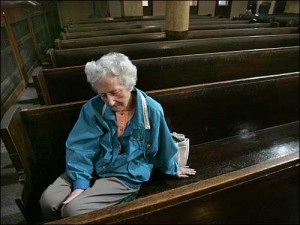 Embracing Reality and Experiencing Freedom
Embracing Reality and Experiencing Freedom
For me, admitting my struggle with depression was taboo. It was something with which Christians should not struggle and for many years I was ashamed to admit my own battle with it. I lived under the assumption that depression is a state of mind and not a medical condition. And though I knew people who took medication for depression, and some of them Christians, relying on medication was a copout. Is life really that difficult that a person should succumb to depression, especially Christians whose reliance should be on God? With some gumption and good sense anyone can get over it. I was going to get over it and so should everyone else. Besides, all one really needs to do is pick themselves up by their bootstraps and move on. It did not occur to me that depression could be more than an occasional bad day or that some people do not even have boots. I realize now that my pride and ignorance not only caused ceaseless anguish in my own life, but more significantly hindered my ability to empathize with and comfort others.
My struggle with depression began in my early twenties. I do not recall a defining moment that initiated the depression, except that circumstances were far from favorable. I was living and working in a small, rural community with little social outlet, and my two closet girl friends and colleagues in ministry had moved away. I was single and very lonely. I often felt “down in the dumps” and did not enjoy life or my usual hobbies and activities. There were also the frequent sleepless nights and, consequently, lack of energy and motivation. Most notably, there were the recurring thoughts of suicide and the night I nearly ended my life with a bottle of aspirin. Yet even in all this I could not bring myself to admit that I needed help. I was too ashamed of my depression to even confide in my Christian brothers and sisters so I withdrew from the body of Christ, those with whom I most needed to be in fellowship, accepting solitude over community.
Only recently, some twelve years later, have I come to acknowledge that my depression is a real medical condition and to willingly accept help in treating it. The breakthrough has gradually come over the course of the past few years; ironically, in the midst of the darkest and most difficult circumstances of my life in which tears, brokenness and loneliness have been constant companions, to the point that I “do not even have boots” many days.
I vividly recall the defining moment when I finally acknowledged my need for help. In tears, I called a friend and mentor from church, a minister on staff, confessing that I was not handling circumstances very well, and for the first time openly admitted my struggle with depression. He encouraged me to seek counseling, which my church offers at no charge, and assured my first appointment was scheduled with ease. He also encouraged me to consider prescription medication.
Medication has helped me manage my depression but counseling has been the most helpful. I have learned a lot about myself and how to be honest with myself and others about my depression. Most significantly, I have learned how to let others care for me. The greatest breakthrough was about a year ago, when in tears and brokenness I confided in my discipleship class at church about my struggle with depression. To confide in a trusted friend and mentor took strength; to confide in a community of Christians took courage I did not know I possessed.
As I have become more honest and open with others I have seen the fruit of their prayers and support. I have learned to rest in God’s unseen arms, trust in His unconditional love and hope in His unfailing promises. What once appeared to be a hopeless situation has become hopeful as I have allowed others to care for and about me, blessing me with their presence in my life and reminding me that I am never alone; I belong to Christ, my hope is in Him, and I have the support of His people.
I have not welcomed the dark and difficult circumstances of the past few years, but I am thankful for the greater purpose they have served in my life. Depression is no longer my shameful secret. It is a fact of life for many people and the reality of my own existence. In finally acknowledging my struggle with depression, not only have I emerged wiser, stronger and more confident of who I am in Christ, but I have experienced freedom to minister to others who struggle with depression. My pride and ignorance have been transformed into empathy and compassion. Rather than being a forbidden topic, my own experience with depression is an opportunity to express concern for others – to pray with and for them; to cry with them, encourage them and support them; and, ultimately, to love them as Christ loves them.
I have relinquished my burden of shame and guilt, I have embraced the body of Christ, and I have experienced the freedom to minister and be ministered to. I am forever blessed and grateful!
~~~
Peggy Molitor lives in Quincy, IL. She acquired a Bachelor of Science degree in Christian Education from Northwestern College and later attained a Master of Arts in Religion from University of Dubuque Theological Seminary. When she isn’t busy with her organizing and cleaning business, she spends her time writing Bible studies and articles for Christian publications.If you would like to contact Peggy about any of her written work, you can email her at peggylynn6@yahoo.com
